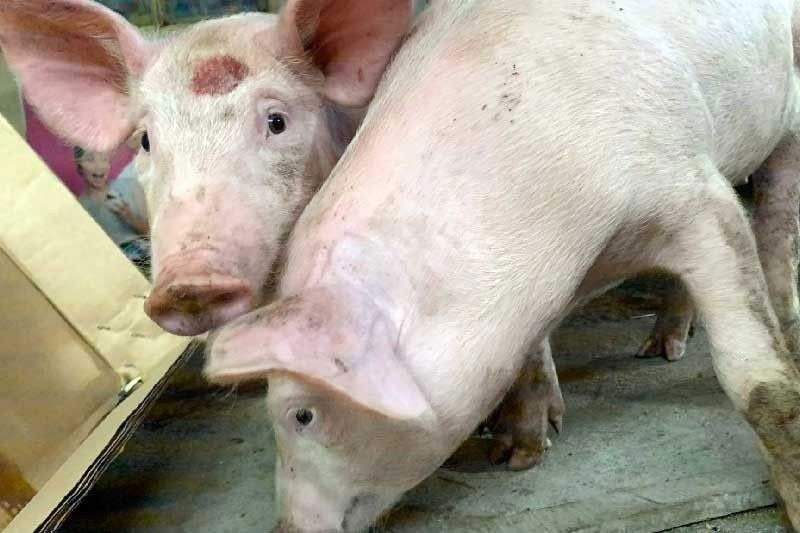Hog raisers outraged; importers welcome lower tariffs

MANILA, Philippines — Hog raisers are appalled by President Duterte’s order to lower tariffs on pork imports while senators are calling for the declaration of a state of calamity as government addresses the supply shortage and the African swine fever (ASF) scourge on the industry.
Last Wednesday, Duterte signed EO No. 128 which approves the Department of Agriculture (DA)’s proposal to adjust the most favored nation (MFN) tariff rates for both in-quota and out-quota imports for pork over a one-year period.
While meat importers and processors are welcoming the move, hog raisers warned of EO 128’s detrimental impact on the local agriculture sector.
“This will kill the local hog industry especially most of our members [who] are small backyard farmers,” Pork Producers Federation of the Philippines Inc. (ProPork) president Edwin Chen told The STAR in a Viber message yesterday.
Under the EO, in-quota or those within the minimum access volume (MAV) will be slapped with a five-percent tariff which will be imposed for the first three months and will be increased to 10 percent from the fourth to 12th month.
Prior to the EO, imports under MAV are charged a 30-percent tariff.
For those outside MAV, a 15 percent tariff will be imposed for the first three months and will be raised to 20 percent from the fourth to 12th month. This is lower than the 40-percent tariff prior to the EO.
The original tariff rates will be returned a year after the EO’s effectivity.
The EO emphasized that the adjustment in tariff rates was made in a bid to address the existing pork supply shortage, stabilize price of pork meat and minimize inflation rates.
National Federation of Hog Farmers Inc. president Chester Warren Tan was also appalled by the reduction of tariff on pork imports, but emphasized that the blame should be put on the DA, which recommended the move in the first place.
“We really don’t understand the strategy of the DA,” Tan said in Filipino, stressing that the department is geared toward supporting importers instead of the local producers.
Tan also pointed out that the recent move of the DA to implement a suggested retail price (SRP) on imported pork products would hurt the local industry as it won’t be able to compete with the low prices of imported meat.
The DA set SRPs of P270 a kilo for pork shoulder or kasim and P350 for pork belly or liempo.
He added these strategies of the DA, especially if the move to increase the MAV by 350,000 metric tons is approved, will further suppress the local hog raising sector and discourage ASF-affected farms from repopulating, which may also affect other agriculture sectors that produce feeds such as the corn and coconut industries.
‘Declare state of calamity’
Yesterday, senators called for a state of calamity to comprehensively address the problems of the local hog industry.
Sen. Francis Pangilinan said that while importation is a solution to the pork supply shortage, there should be a declaration of a state of calamity to allow the release and use of the calamity funds for disaster management.
“If they really wish to address seriously the concerns of local hog industry, the declaration of a state of calamity declaration is critical,” said Pangilinan.
He said there was a P2.6-billion budget for 2021 for ASF management, though funds actually needed amount to P8.6 billion, including indemnification, cash assistance, cash for work program, and implementation of border patrols.
Senate eyes oversight
Pangilinan said senators would also urge the Senate agriculture committee to exercise its oversight functions to monitor and prevent abuses in meat importation under EO 128.
The Senate committee must require the DA to submit regular reports on the volumes and names of importers, volume, permits issued, and also monitor prices of pork in the local markets, the senator said.
“We, in the Senate, will work together to make sure that this pork importation of millions of kilos of pork is not abused,” he added.
He noted that about P12 billion will not be collected in tariffs as a result of the reduction under EO 128.
Sen. Cynthia Villar said that while she does not agree with this move, she respects the President’s decision to cut tariffs on meat imports.
“I don’t agree but this is his decision as President. I researched that the biggest yearly importation of meat as per record of Bureau of Customs is about 380,000 metric tons. About 70 percent or about 260,000 metric tons are offal with five percent to 10 percent tariff and the 30 percent or about 120,000 metric tons are good meat with 30 percent tariff. The tariff is low already and I do not think there is a need to bring down the tariff anymore,” Villar said.
Sen. Risa Hontiveros said Malacañang’s decision was “very disappointing.”
“Clearly, hog revival is not part of its plan. In this situation, it seems that we have given up on our local pig farmers who have been turned away,” she said.
Also fuming was Sen. Imee Marcos who accused the DA of “crippling the government’s ability to raise much needed revenue to cope with the double onslaught of African swine fever and COVID-19.”
Like Villar, Sen. Panfilo Lacson respects the decision of the President, but said the Senate committee of the whole will look thoroughly on the issue during the public hearing on Monday.
“That is bad news!” said Senate President Vicente Sotto III in reaction to the signing of EO 128 which Senate members had earlier opposed.
“The MAV could have been raised but not the lowering of tariff. The reason they are giving for the lowering of taxes is not acceptable. There must be something else. That’s what we want to find out on Monday,” he said.
Group slams Dar
In a statement, the Samahang Industriya ng Agrikultura (SINAG) held Agriculture Secretary William Dar responsible for the consequences these pose on the agriculture industry.
“The pleas of the whole agriculture sector as well as the Senate and the House leadership have fallen on deaf ears. There are no words to express the outrage and betrayal to the millions of hog raisers and workers dependent on the hog industry,” said SINAG chairman Rosendo So.
“We are holding Agriculture Secretary Dar responsible for the loss of livelihoods, job displacements and business closures in the agriculture sector,” he added.
SINAG emphasized that millions of families in the agriculture sector rely directly on the hog industry, as well as thousands of workers and businesses that provide animal health products and animal supplements. It added that feed millers, viajeros, backyard processors, retailers and market vendors are also heavily dependent on the sector.
EO 128 favors consumers
In contrast to the outrage of the local hog sector, meat importers and processors are welcoming the reduction in tariff on pork imports as a benefit for consumers.
“It’s a big win for the consumers and the economy. Consumers will be able to enjoy affordable pork meat. We will strive to bring down prices so consumers can benefit,” Meat Importers and Traders Association (MITA) president Jess Cham said in a Viber message.
Similarly, the Philippine Association of Meat Processors Inc. (PAMPI) said the lowering of tariff is also seen to benefit Filipino consumers.
“Meat processors and legitimate importers will benefit from this landmark decision, and this will allow us to bring back affordable value-added pork products to the market,” PAMPI said in a statement.
The group urged local hog raisers to capitalize on the lower tariff by also importing pork products.
For his part, Dar said the DA will properly implement the EO with concerned agencies.
“This will bring pork prices down and will tame inflation. We will also enhance the repopulation of the hog industry,” Dar told The STAR in a mobile message.
Poultry supply
Meanwhile, meat processors welcomed the government’s move to allow the importation of mechanically deboned meat (MDM) poultry, but said it may not be enough to fully supply the needs of the country at affordable price levels.
“On the whole, the conditions are very stringent, so we will wait if exporters can ship even with additional cost, especially on the PCR (polymerase chain reaction) test that will surely drive up the price of MDM,” PAMPI vice president Jerome Ong said.
“Our view right now is that without lifting the countrywide bans on UK and Germany, the reopening of Poland, the accreditation of new plants in Hungary and Brazil, the supply of MDM will remain inadequate and hinder the processed meat industry from fully supplying the needs of the country at affordable price levels,” he added.
Last Tuesday, Dar issued Memorandum Order No. 27 to amend Memorandum No. 3 issued in January, which imposed a temporary ban on the importation of domestic and wild birds and their products including poultry meat, day old chicks and eggs due to the widespread outbreaks of highly pathogenic avian influenza in several areas of the Netherlands.
The DA emphasized, however, that the new memorandum only allows the importation of MDM poultry from that country. – Cecille Suerte Felipe, Artemio Dumlao
- Latest
- Trending



























